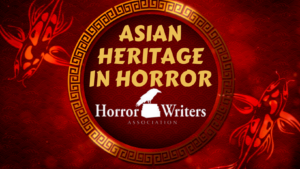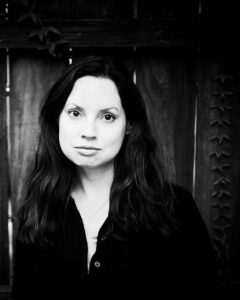Asian Heritage in Horror: Interview with Kiyomi Appleton Gaines

 Kiyomi Appleton Gaines is a writer of fairy tales and other fantastical things. She was a 2018 Contributing Editor at Enchanted Conversation, and contributor to Mad Scientist Journal 2019 Spring Quarterly. Her work has also appeared in Nightmare Magazine, Quail Bell Magazine, and The Grimm Reaper. Find more of her writing at a work of heart and follow her on Twitter @ThatKiyomi. Kiyomi is an Asian-American of Japanese descent. She lives in New Orleans with her husband, two marmalade cats, and a snake.
Kiyomi Appleton Gaines is a writer of fairy tales and other fantastical things. She was a 2018 Contributing Editor at Enchanted Conversation, and contributor to Mad Scientist Journal 2019 Spring Quarterly. Her work has also appeared in Nightmare Magazine, Quail Bell Magazine, and The Grimm Reaper. Find more of her writing at a work of heart and follow her on Twitter @ThatKiyomi. Kiyomi is an Asian-American of Japanese descent. She lives in New Orleans with her husband, two marmalade cats, and a snake.
What inspired you to start writing?
I’ve always been telling monster stories, since before I knew what I was doing. My parents recount me playing make-believe and telling accounts of imaginary monsters and “princettes” as a toddler. When I would run around with my cousins, we were always making up stories about the characters we were living through. Writing allowed me to continue to do that.
What was it about the horror genre that drew you to it?
I’ve always connected to stories of the outcast, of those who didn’t quite fit in. I was an odd kid. I was always trying to figure out how to do and be what I was supposed to, but often falling short and feeling out of place. Those who diverge too much are thought of as monsters, and that idea resonated with me. “Monster” is one of my favorite words: at its root it means a warning. What are these things that frighten us warning us of?
Do you make a conscious effort to include Asian Diaspora characters and themes in your writing and if so, what do you want to portray?
I include stories and narratives that resonate with me. As an Asian American, that’s a variety of tales. But one of the earliest stories I grew up with was Kaguyahime, and there are many other Japanese stories that I’m familiar with. I think there’s a different aesthetic for those of us who grew up in that in-between. In the last few years, as anti-Asian sentiment specifically has increased, I think I have been more conscious of my identity as an Asian American woman, and of trying to make more sense of the stories I live through that context.
What has writing horror taught you about the world and yourself?
Everything! Horror provides an avenue for exploring the things that make us uncomfortable and taking up space to be uncomfortable to others in pursuit of greater understanding, justice, equity. That’s part of the way writers contribute to building a better world.
How have you seen the horror genre change over the years? And how do you think it will continue to evolve?
I hope it will continue to make space for the things that are warnings to us – the things that most need our attention – and to make space for voices and perspectives that have been neglected.
How do you feel the Asian community has been represented thus far in the genre and what hopes do you have for representation in the genre going forward?
There are brilliant writers who are doing really beautiful representative work. My hope is that there won’t be a question in the future about how a hero is described or represented, there won’t be conversations around whether or not an Asian character or family can be “relatable.” I remember being a child and seeing the most beautiful and influential women in media were so different from me, and from the women I saw and most admired in my young world. But I’ve also had the benefit of knowing such amazing Asian women. I hope for a world where their daughters don’t have to fight so hard.
Who are some of your favorite Asian characters in horror?
Just a few off the top of my head: Mu-Yeong in Kingdom. Kim Ki-jung in Parasite. Sunny in Into the Badlands. Julie Dao’s Xifeng in The Rise of the Empress books. Candace Chen in Ling Ma’s Severance. Tomomi Ishikawa in Benjamin Constable’s The Three Lives of Tomomi Ishikawa.
Who are some Asian Diaspora horror authors you recommend our audience check out?
K.P. Kulski, Elaine Cuyendkeng, Julie Dao, Grace Chan, Ling Ma, Han Kang, Kazuo Ishiguro. So many others. Lee Murray and Angela Yuriko Smith put together a wonderful anthology of horror stories by Asian women and nonbinary writers. They each bring some element of the uncanny and that discomfort of things being not-quite-as-they-seem to their stories. One of my quick ways find new writers to read is to hop onto social media and see who else my favorite storytellers are reading and following.
What is one piece of advice you would give horror authors today?
Take care with how people are described, including secondary or tertiary characters. Be thoughtful about who is a hero, who is a victim, who is a villain, and who gets to frame and define the narrative. Be very careful and aware of bias and stereotypes.
And to the Asian writers out there who are just getting started, what advice would you give them?
Tell the stories that fascinate you, that you wish were being told, that you want to read.



